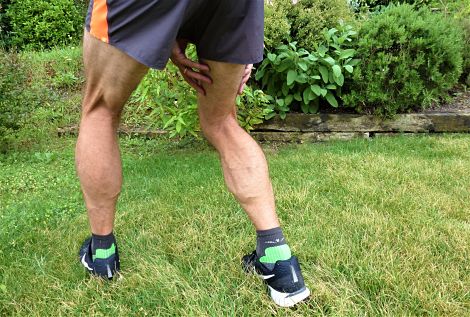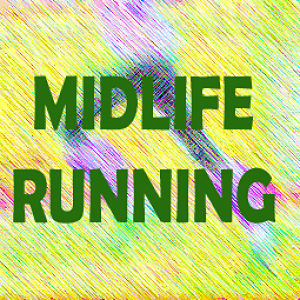Leg Cramps Running

Leg cramps running can literally stop you in your tracks. The cramps might affect your calves, your thighs, your hamstrings or perhaps your side. For now I am going to talk about leg cramps but you can find more about side cramps here.
What are Cramps?
A cramp is defined as an involuntary contraction of a muscle. The affected muscle suddenly contracts and becomes tight and hard. It can be so painful that it literally stops you in your tracks.
As a runner, you may have heard of them being referred to as Exercise Related Muscle Cramps (ERMC) and although they are not dangerous, they can feel scary and are pretty painful when they occur.
These cramps tend to affect the larger muscles such as your calves, thighs or hamstrings and can occur during or after exercise. The cramp can last for seconds or even minutes.
Leg Cramps Running and What it Feels Like
Running cramps can often take you by surprise and are something that many runners or cyclists dread.
They may come on rapidly or you may first start to feel a slight muscle tightness or twitching which then rapidly develops into a rock hard muscle, accompanied by excruciating pain. You cannot walk or even more forward and your leg muscle feels locked.
Sometimes you can visibly see the muscle twitch or perhaps even twist and writhe around as though you have an alien in your muscle.
When your calf or hamstring is affected, you might fall to the floor as you try to relieve the contracting muscle. The pain might just last a few seconds or it may last a minute or more.
Causes of Leg Cramps Running
In the past, it was suggested that dehydration, lack of electrolytes such as sodium or potassium or the build up of lactic acid, were the causes of cramps while running.
However research has started to show that in fact there are also other causes of cramps among runners. Lack of muscle strength and fatigue has now been shown to be perhaps the major cause of running cramps.
As a runner, you should consider the following as the 2 main causes of your running cramps:
Electrolyte imbalance
When you run, your body gets hotter. In an attempt to cool down, your body sweats. Sweat contains body salts and other electrolytes (think of the salty taste around your mouth at the end of a run ) and so the more you sweat, the more electrolytes you lose.
Sweating is normal and usually doesn't pose a problem. However, during exercise, some people sweat more than others. If the sweating becomes excessive and you don't replace the lost fluids and electrolytes, their levels can dip below what is considered a normal range and this is thought to result in cramps.
Other reasons for an electrolyte imbalance are if your body has not been sufficiently hydrated before a long event (ie longer than 2 hours) or if your dietary salt intake has been very low. This is why you hear people advising you to hydrate well in the week leading up to a half or full marathon.
Another important cause is low magnesium levels as described in The Art and Science of Low Carbohydrate Performance by Volek and Phinney. Runners who are following a low carbohydrate or keto diet can experience a drop in magnesium which can lead to muscle cramps. (Please note that as an Amazon associate I earn from any qualifying purchases).
Signs that you are suffering from electrolyte imbalance cramps:
- Can be more of a gradual onset. You may feel your muscles starting to twitch or get a little tight before you get a full blown cramp.
- The cramps are usually bilateral e.g. in both calves or in both thighs.
- You have been sweating a lot.
How to improve your electrolyte imbalance in order to prevent leg cramps.
Muscle Imbalance or Weakness
These cramps occur when you are repeatedly using a set of muscles that are not used to the overload. Usually in runners it is the calves, quads and hamstrings that are affected.
Imagine that you decide to enter a half marathon race with lots of elevation and tricky descents but yet you have only trained on flat roads. Chances are that you will develop cramp during the race.
Case study: I recently participated in a 22km trail. I felt that I had trained well and put in the mileage and the elevation. However on the day, I suffered terribly with cramps in my calves and thighs. I realized afterwards that I had not trained on the right terrain. Although I had done lots of elevation on roads and paths, the actual trail race was on rocky mountain sides and my legs were not used to it.
In a normal situation, we have nerve mechanisms that tell our muscles to contract and relax without us even thinking about it. However when a muscle is overworked, those nerve mechanisms get a bit confused. The mechanism that normally tells the muscles to contract gets a bit over-excited and manic. This causes the muscle to over-contract, resulting in a painful cramp.
Signs that you are suffering from cramps due to muscle imbalance or weakness:
- The cramps may come on suddenly.
- They may not be bilateral e.g. one calf may cramp but not the other.
- The cramps respond quickly to stretching or massage of the affected muscle.
How to improve muscle conditioning in order to prevent leg cramps running.
Other causes of leg cramps running
There are a few other reasons which also cause running cramps.
- Lack of stretching: Runners are notorious for not stretching enough after a workout. Muscles are made up of bundles of fibres that contract and expand. By stretching these fibres gently and regularly, you are allowing the muscle to work at its best. If the fibres are not stretched then the muscles will fatigue quicker which in turn leads to cramp.
- The older you get: Older runners are more prone to cramps. This might be due to the fact that as we age, our muscles start to lose strength and the nerve pathways become less reactive. This means the communication between our muscles and nerves is weaker then when we were younger.
- Overdoing exercise and workouts: We all know of the person who throws themselves one hundred and ten percent into their workouts and training. The no pain no gain person. Those same people are also more likely to suffer with leg cramps running as their muscles never have time to rest and recuperate.
- Sickness or being overweight.
- Certain medications.
Here's how you can you prevent leg cramps and what to do if you get leg cramps running.



